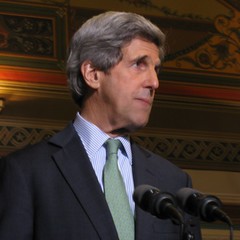Monday
May042009
The Senate Rebuilds Pakistan
By Michael Ruhl, University of New Mexico - Talk Radio News Service
In the next 5 years, the Pakistani infrastructure will be fortified by almost $10 billion American dollars, if Senators John Kerry (D-Mass.) and Richard Lugar (R-Ind.) have anything to say about it. The aptly titled Kerry-Lugar Bill will provided money for rebuilding the lives of civilians in war torn Pakistan.
Both Kerry and Lugar said that most of the money that has been funneled into Pakistan in the past few years has gone towards security. The aim of this bill is to shift the balance, to place more of an emphasis on infrastructure.
The Senators want to use the money for building schools, improving health care, building bridges, water projects, and other elements of infrastructure. Kerry said that the target projects are “things that would improve life and give people a sense of progress” to civilians.
The money would also be used for ensuring an independent media, expanding human rights and the rule of law, expanding transparency in government, rooting out political corruption and countering the drug trade.
Additionally military funding would be conditioned upon several things, including Pakistani security forces preventing al Qaeda and Taliban forces from operating in Pakistan. The military forces would not be able to interfere in politics or in the judicial process, according to the provisions of the bill.
The legislation bill would give $1.5 billion each year from FY 2009-2013, and would recommend similar amounts of money over the subsequent five years. There would be required benchmarks to measuring how effective the funding is, and the President will have to submit semi-annual reports to Congress about progress made.
In the next 5 years, the Pakistani infrastructure will be fortified by almost $10 billion American dollars, if Senators John Kerry (D-Mass.) and Richard Lugar (R-Ind.) have anything to say about it. The aptly titled Kerry-Lugar Bill will provided money for rebuilding the lives of civilians in war torn Pakistan.
Both Kerry and Lugar said that most of the money that has been funneled into Pakistan in the past few years has gone towards security. The aim of this bill is to shift the balance, to place more of an emphasis on infrastructure.
The Senators want to use the money for building schools, improving health care, building bridges, water projects, and other elements of infrastructure. Kerry said that the target projects are “things that would improve life and give people a sense of progress” to civilians.
The money would also be used for ensuring an independent media, expanding human rights and the rule of law, expanding transparency in government, rooting out political corruption and countering the drug trade.
Additionally military funding would be conditioned upon several things, including Pakistani security forces preventing al Qaeda and Taliban forces from operating in Pakistan. The military forces would not be able to interfere in politics or in the judicial process, according to the provisions of the bill.
The legislation bill would give $1.5 billion each year from FY 2009-2013, and would recommend similar amounts of money over the subsequent five years. There would be required benchmarks to measuring how effective the funding is, and the President will have to submit semi-annual reports to Congress about progress made.
tagged  2013,
2013,  Congress,
Congress,  Health Care,
Health Care,  Human Rights,
Human Rights,  Indiana,
Indiana,  Legislation,
Legislation,  Massachusetts,
Massachusetts,  Michael Ruhl,
Michael Ruhl,  Pakistani,
Pakistani,  Ruhl,
Ruhl,  Rule of Law,
Rule of Law,  al qaeda,
al qaeda,  bill,
bill,  bridges,
bridges,  civilian,
civilian,  civilians,
civilians,  corruption,
corruption,  democrat,
democrat,  drug trade,
drug trade,  drugs,
drugs,  free media,
free media,  government,
government,  independence,
independence,  independent,
independent,  infrastructure,
infrastructure,  john kerry,
john kerry,  media,
media,  michael,
michael,  michael t ruhl,
michael t ruhl,  michaeltruhl,
michaeltruhl,  pakistan,
pakistan,  political corruption,
political corruption,  republican,
republican,  richard lugar,
richard lugar,  schools,
schools,  security,
security,  senate,
senate,  senator,
senator,  taliban,
taliban,  transparency,
transparency,  water,
water,  water projects in
water projects in  Congress,
Congress,  News/Commentary
News/Commentary
 2013,
2013,  Congress,
Congress,  Health Care,
Health Care,  Human Rights,
Human Rights,  Indiana,
Indiana,  Legislation,
Legislation,  Massachusetts,
Massachusetts,  Michael Ruhl,
Michael Ruhl,  Pakistani,
Pakistani,  Ruhl,
Ruhl,  Rule of Law,
Rule of Law,  al qaeda,
al qaeda,  bill,
bill,  bridges,
bridges,  civilian,
civilian,  civilians,
civilians,  corruption,
corruption,  democrat,
democrat,  drug trade,
drug trade,  drugs,
drugs,  free media,
free media,  government,
government,  independence,
independence,  independent,
independent,  infrastructure,
infrastructure,  john kerry,
john kerry,  media,
media,  michael,
michael,  michael t ruhl,
michael t ruhl,  michaeltruhl,
michaeltruhl,  pakistan,
pakistan,  political corruption,
political corruption,  republican,
republican,  richard lugar,
richard lugar,  schools,
schools,  security,
security,  senate,
senate,  senator,
senator,  taliban,
taliban,  transparency,
transparency,  water,
water,  water projects in
water projects in  Congress,
Congress,  News/Commentary
News/Commentary 






In VA-35, Both Campaigns Predict Tight Race
Hyland’s margin, described by his campaign manager Kevin Conroy as “within the margin of error,” reflects a tightening of the race since a July benchmark poll, when pollsters Barry Zeplowitz and Bill Lee of TelOpinion Research indicated in a confidential memo posted on Hyland’s website that Hyland held a 7-point lead 43 percent to 36 percent lead, with 21 percent undecided. The memo did not indicate the size of the sample or whether “likely voter” filters were used.
Read more at Collins on Politics